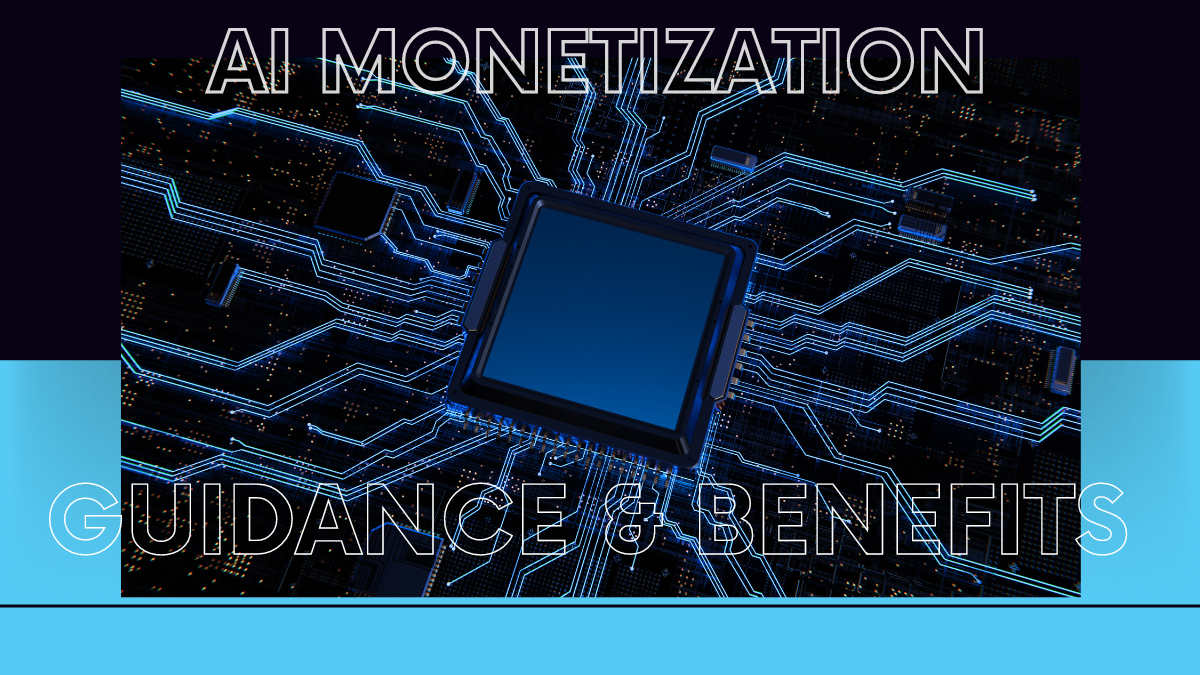
As organizations harness the power of AI Monetization to streamline operations, enhance customer experiences, and drive innovation, the concept of AI monetization has emerged as a key strategy for unlocking new revenue streams and maximizing return on investment.
Table of Contents
Introduction to AI Monetization
AI monetization refers to the process of generating revenue from AI technologies, applications, and insights. It encompasses a variety of strategies aimed at leveraging AI assets to create tangible economic value. From data monetization to product and service offerings, businesses are exploring diverse avenues to capitalize on the potential of AI.
Types of AI Monetization Strategies
Data Monetization
Data has become a valuable commodity in the digital age, and AI plays a crucial role in extracting actionable insights from vast datasets. Data monetization involves selling, licensing, or leveraging proprietary data assets to generate revenue. Companies can monetize data through targeted advertising, insights-as-a-service offerings, or by providing data-driven solutions to third parties.
Product Monetization
AI-powered products have disrupted traditional industries and created new market opportunities. Product monetization in the realm of AI involves developing and commercializing software, hardware, or integrated solutions that leverage AI capabilities. Examples include AI-powered virtual assistants, predictive analytics tools, and autonomous systems.
Service Monetization
Service-based monetization models focus on delivering AI-powered services to customers or clients. This may include consulting, training, implementation, or managed services that leverage AI technologies to solve specific business challenges. Service monetization offers flexibility and scalability, allowing businesses to tailor solutions to meet the unique needs of their clients.
Challenges in AI Monetization
Despite the potential benefits, AI monetization presents several challenges that businesses must navigate. Regulatory challenges, such as data privacy regulations and intellectual property rights, can impact the monetization of AI assets. Additionally, technical hurdles, such as data quality issues and algorithmic biases, may hinder the effectiveness of AI monetization strategies.
Opportunities in AI Monetization
Despite these challenges, AI monetization presents significant opportunities for forward-thinking organizations.
Emerging trends, such as edge computing, federated learning, and blockchain-based data marketplaces, are reshaping the landscape of AI monetization. By capitalizing on these trends and exploring untapped markets, businesses can unlock new revenue streams and drive growth.
Best Practices for AI Monetization
To succeed in AI monetization, businesses must adopt best practices that align with their strategic objectives.
Understanding the target audience and their specific needs is essential for developing tailored AI solutions. Leveraging advanced analytics and machine learning algorithms can help businesses derive actionable insights from data assets. Continuous innovation and experimentation are also key to staying ahead of the curve in the rapidly evolving AI landscape.
Future of AI Monetization
As AI technologies continue to advance, the future of AI monetization looks promising.
Predictions suggest that AI will become increasingly integrated into everyday products and services, creating new opportunities for monetization. From personalized healthcare solutions to autonomous transportation systems, the possibilities are endless. However, businesses must remain agile and adaptable to navigate the evolving landscape of AI monetization successfully.
AI Monetization for Earning
Monetizing AI can be approached in various ways, depending on your resources, expertise, and goals. Here are some avenues for earning through AI:
AI Consulting Services:
Offer your expertise to businesses seeking AI solutions. This could include advising on AI strategy, developing custom AI models, or providing AI implementation and integration services.
AI Software Development:
Create and sell AI-powered software products. This could be anything from specialized tools for data analysis to AI-driven applications for specific industries like healthcare or finance.
AI as a Service (AIaaS):
Offer AI capabilities through a subscription-based model. This could involve providing access to pre-trained AI models, APIs for integrating AI into existing software, or cloud-based AI platforms.
AI Training and Education:
Develop and sell online courses, workshops, or training programs to teach others about AI. This could be targeted towards individuals looking to learn AI skills or businesses seeking to upskill their employees.
AI Content Creation:
Use AI to generate content such as articles, videos, or music, and monetize it through advertising, subscriptions, or pay-per-view models.
AI Research and Development:
Conduct research in AI and sell the resulting patents, technologies, or insights to companies or investors interested in advancing AI capabilities.
AI Data Labeling and Annotation:
Offer data labeling and annotation services to companies training AI models. This involves labeling data to train machine learning algorithms and can be monetized on a per-task or subscription basis.
AI-Driven Marketing and Advertising:
Develop AI-powered marketing tools or services that help businesses optimize their advertising campaigns, target audiences more effectively, or personalize marketing content.
AI in Healthcare:
Develop AI-driven healthcare solutions such as diagnostic tools, patient monitoring systems, or personalized treatment recommendations, and monetize them through sales, subscriptions, or partnerships with healthcare providers.
AI in Finance:
Build AI algorithms for financial analysis, trading, risk management, or fraud detection, and offer them to banks, investment firms, or individual investors for a fee.
Remember to consider factors such as market demand, competition, and scalability when choosing your monetization strategy. Additionally, staying updated on the latest advancements and trends in AI can help you identify new opportunities for earning.
AI Monetization for Student
Monetizing AI as a student can be a great way to not only earn some extra income but also to gain valuable experience and showcase your skills. Here are some potential avenues for monetizing AI as a student:
Freelancing Platforms:
Websites like Upwork, Freelancer, and Fiverr allow you to offer your AI services to clients around the world. You can create gigs or proposals specifically tailored to tasks such as data analysis, machine learning model development, natural language processing, or computer vision.
Consulting:
If you have expertise in a particular domain or industry, consider offering consulting services to businesses looking to implement AI solutions. You could help them identify opportunities for AI integration, develop custom AI solutions, or optimize existing AI systems.
Developing AI Products:
Use your AI skills to develop software products or applications that solve specific problems. You can then monetize these products by selling licenses, subscriptions, or through in-app purchases. Look for niche markets or industries where AI solutions are in demand but currently underserved.
Tutoring and Training:
Many individuals and organizations are looking to upskill in AI and machine learning. You can offer tutoring or training services, either through one-on-one sessions, group workshops, or online courses.
Content Creation:
Start a blog, YouTube channel, or podcast where you share tutorials, insights, and tips related to AI and machine learning.
Competitions and Challenges:
Participate in AI competitions and challenges hosted by platforms like Kaggle or Topcoder. Not only can you win prize money or rewards, but you can also gain recognition and attract potential clients or employers.
Internships and Part-time Jobs:
Look for internships or part-time positions at companies that are working on AI projects. Even if the role is unpaid or low-paying initially, the experience and networking opportunities can be invaluable for future career prospects.
Academic Research:
If you’re pursuing advanced studies in AI or a related field, consider publishing your research findings in academic journals or presenting them at conferences. You may receive grants, scholarships, or stipends for your research, and you could also attract the attention of companies or investors interested in commercializing your work.
Remember to always prioritize learning and ethical considerations in your AI endeavors, and seek guidance from mentors or professionals in the field.
How to do AI Monetization
Monetizing AI can be approached in several ways, depending on the nature of your AI application and the market you’re targeting. Here are some strategies:
AI as a Service (AIaaS):
Offer your AI capabilities as a service to businesses or individuals. This could involve providing APIs or SDKs that allow other companies to integrate your AI technology into their products or workflows. You can charge based on usage, subscription models, or tiered pricing based on features.
Licensing and Royalties:
If you’ve developed proprietary AI algorithms or models, you can license them to other companies for a fee. This could involve negotiating royalties based on the usage or revenue generated by the AI technology.
Custom Solutions:
Develop customized AI solutions for businesses to address specific challenges or optimize processes. This could involve consulting fees, project-based pricing, or revenue-sharing arrangements based on the value delivered.
Data Monetization:
If you’ve collected valuable datasets to train your AI models, you can monetize this data by selling access to it or by providing insights derived from the data to other businesses. Ensure compliance with data privacy regulations and obtain proper consent for data usage.
AI-driven Products and Applications:
Develop AI-powered products or applications that solve specific problems or cater to niche markets. You can monetize these products through direct sales, subscriptions, in-app purchases, or advertising.
Partnerships and Collaborations:
Partner with other companies to jointly develop AI solutions or integrate your AI technology into their products or services. This can expand your reach and generate revenue through revenue-sharing agreements or licensing deals.
Training and Education:
Offer training courses, workshops, or certification programs to individuals or businesses looking to learn about AI or develop AI skills. This could include online courses, seminars, or hands-on training sessions.
Consulting and Expert Services:
Provide consulting services to businesses looking to implement AI solutions or optimize existing AI initiatives. This could involve strategy development, implementation support, or performance optimization.
AI Marketplaces:
Create or participate in AI marketplaces where developers, businesses, and researchers can buy, sell, or exchange AI models, datasets, or algorithms. You can generate revenue through transaction fees, subscription plans, or premium features.
Advertising and Sponsorship:
If you have AI-powered platforms or applications with a large user base, you can monetize through advertising or sponsorship deals. Use AI to personalize ads and optimize ad placement for better engagement and ROI.
When implementing AI monetization strategies, consider factors such as market demand, competitive landscape, pricing models, scalability, and intellectual property protection. Additionally, prioritize ethical considerations such as data privacy, bias mitigation, and transparency to build trust with your customers and stakeholders.
Visit Website :- guest post buy
Also Visit :- Telegram
Conclusion
In conclusion, AI monetization represents a significant opportunity for businesses to unlock the full potential of artificial intelligence. By leveraging data, developing innovative products and services, and adopting best practices, organizations can capitalize on the transformative power of AI to drive revenue growth and competitive advantage.





